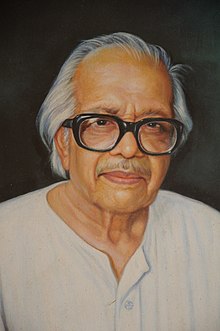Ravindra Kelekar | |
|---|---|
 Portrait of Kelekar | |
| Born | 7 March 1925[1] Cuncolim, Goa, Portuguese India, Portuguese Empire |
| Died | 27 August 2010 (aged 85) Margao, Goa, India |
| Resting place | Priol, Goa, India[2] |
| Occupation | freedom fighter, linguistic activist, poet, author |
| Language | Konkani |
| Nationality | Indian |
| Spouse | Godubai Kelekar |
| Children | 1 |
| Relatives |
|
Ravindra Kelekar (7 March 1925 – 27 August 2010) was a noted Indian author who wrote primarily in the Konkani language, though he also wrote in Marathi and Hindi.[4] A Gandhian activist, freedom fighter and a pioneer in the modern Konkani movement, he was a well known Konkani scholar, linguist, and creative thinker. Kelekar was a participant in the Indian freedom movement, Goa's liberation movement, and later the campaign against the merger of the newly formed Goa with Maharashtra. He played a key role in the founding of the Konkani Bhasha Mandal, which lead the literary campaign for the recognition of Konkani as a full-fledged language, and its reinstatement as the state language of Goa.[5] He authored nearly 100 books in the Konkani language, including Amchi Bhas Konkaneech, Shalent Konkani Kityak, Bahu-bhashik Bharatant Bhashenche Samajshastra and Himalayant, and also edited Jaag magazine for more than two decades.
Kelekar died at Apollo Hospital at Margao, Goa at around 11.30 am on Friday, 27 August 2010. He was 85.[4][6] His remains were cremated with State honours at his native village of Priol.[2]
Kelekar received the Padma Bhushan (2008),[7][8] the Gomant Sharada Award of Kala Academy,[8] the Sahitya Akademi Award (1977),[9] and the Sahitya Akademi Fellowship (2007)—the highest award of the Sahitya Akademi, India's National Academy of Letters.[10] He also received the 2006 Jnanpith Award,[11] the first ever awarded to an author writing in the Konkani language,[1] which was presented in July 2010.[12]
- ^ a b "41st Jnanpith Award to Eminent Hindi Poet Shri Kunwar Narayan and 42nd Jnanpith Award jointly to Eminent Konkani Poet and Author Shri Ravindra Kelekar and Sanskrit Poet and Scholar Shri Satya Vrat Shastri" (PDF) (Press release). Jnanpith. 22 November 2008. Archived from the original (PDF) on 15 February 2010.
- ^ a b "Ravindra Kelekar cremated at native village". The Hindu. Chennai, India. 29 August 2010. Archived from the original on 8 November 2012. Retrieved 25 September 2010.
- ^ "GOA'S NEW SANTAS". 23 December 2016.
- ^ a b "Ravindra Kelekar passes away". The Hindu. Chennai, India: The Hindu Group. 28 August 2010. Archived from the original on 13 September 2010. Retrieved 25 September 2010.
- ^ Cite error: The named reference
ttowas invoked but never defined (see the help page). - ^ Saradesāya, Manohararāya (2000). A history of Konkani literature: from 1500 to 1992. Sahitya Akademi. p. 209. ISBN 81-7201-664-6.
- ^ "Padma Bhushan Awardees". Know India: National portal of India. Ministry of Communications and Information Technology. Archived from the original on 5 June 2009. Retrieved 25 September 2010.
- ^ a b "The man who most influenced a language". The Times of India. 23 November 2008. section Times City, p. 4. Archived from the original on 4 December 2008. Retrieved 21 December 2008.
- ^ "AKADEMI AWARDS (1955-2018)". Retrieved 1 March 2019.
- ^ "Akademi confers fellowship on Ravindra Kelekar". The Hindu. Chennai, India. 8 October 2007. Archived from the original on 3 November 2012. Retrieved 25 September 2010.
- ^ Kamat, Prakash (24 November 2008). "Jnanpith for Kelekar". The Hindu. Chennai, India. Archived from the original on 21 November 2009. Retrieved 25 September 2010.
- ^ "Konkani litterateur Ravindra Kelekar presented Jnanpith Award 2006". The Hindu. Chennai, India. 1 August 2010. Archived from the original on 5 August 2010. Retrieved 1 August 2010.